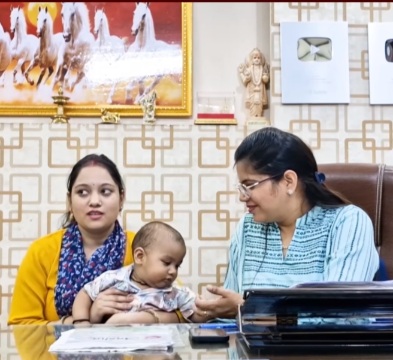During pregnancy, the modern pace of life can sometimes be harmful, and I’ve seen how these changes can impact both the mother and the unborn child.
As a gynecologist and the Director of Asha Ayurveda, we believe that by embracing certain habits, we can significantly improve the chances of a normal delivery—a practice that has become less common due to the increasing number of cesarean sections.
One of the main reasons I see for the rise in cesarean deliveries is the decline in physical activity during pregnancy.
In the past, most women gave birth naturally, but now, with our more sedentary lifestyles, we’re seeing a shift.
I can’t stress enough how important it is for expectant mothers to stay active. When we neglect physical labor, our flexibility decreases, and our body weight can increase, making it harder for us to have a normal delivery.
From my experience and research, I’ve found that women who are less active during pregnancy often face complications that could lead to a cesarean. Our diet plays a big role in this too.
If we’re eating unhealthy food and not getting enough nutrients, our weight can increase rapidly, creating further challenges for normal delivery.
In today’s busy world, I know it’s easy to fall into unhealthy habits—eating poorly, moving less, and stressing more. But these habits can have a direct impact on pregnancy.
When complications arise, cesarean delivery becomes necessary to ensure the safety of both the mother and the child.
I want to remind everyone that a cesarean is a major operation, and we should aim to avoid it whenever possible by taking better care of ourselves.
For those of us who want to increase our chances of a normal delivery, staying physically active is crucial. I recommend daily exercise or stretching during pregnancy.
If exercising is difficult, even a 30-minute walk can make a big difference. I’ve seen how regular physical activity not only keeps our posture in check but also helps reduce stress, keeping us in better health and ready for a normal delivery.
In earlier times, women naturally got their workouts in by doing household chores like operating a grinder. Nowadays, since we’re less active, it’s even more important to pay attention to our physical health during pregnancy.
To those of us hoping for a normal delivery, I’d suggest focusing on a few key things: eating nutritious food, staying physically active, managing stress, and keeping our bodies hydrated.
Regular checkups are also vital. By staying in close contact with our doctors, we can better understand our condition and make informed decisions throughout our pregnancy.
By adopting these habits, we can significantly improve our chances of having a normal delivery and ensure a healthier pregnancy for both ourselves and our babies.
About Dr Chanchal Sharma:
OUR life's mission is to help women overcome infertility through Ayurveda, the world’s oldest and most holistic system of medicine.
Ayurveda is often called the "mother of all medicines" because it laid the foundation for all other medical systems. This ancient wisdom guides my work every day.
I earned my degree in Ayurvedic Medicine and Surgery (BAMS) and further specialized in women’s health through a Diploma in Gynecology and Obstetrics (DGO).
I also pursued advanced studies in alternative medicine (MD-AM) and became certified in Panchakarma, a traditional Ayurvedic detoxification therapy.
My education followed the revered Guru Shishya Parampara, a method of learning passed down directly from teacher to student.
My approach is deeply rooted in the ancient Ayurvedic texts like Charaka Samhita, Sushruta Samhita, and Ashtanga Hridaya.
These texts are the bedrock of my practice and inspire my commitment to promoting health and happiness, especially for women facing the challenges of infertility.
For over a decade, I’ve been treating patients at Asha Ayurveda, where I apply the principle of Panchamahabhootas—the five basic elements that make up everything in the universe.
By understanding and balancing these elements in the body, I work to restore harmony and health, addressing the root causes of disease.
I’m especially proud of my "Childlessness Quit India" campaign, which is all about giving hope to women who have struggled to conceive.
Many of these women have tried modern medical treatments without success, and I offer them the healing power of Ayurveda.
At Asha Ayurveda, I focus on treating a range of infertility-related conditions that modern medicine often struggles to resolve.
These include blockages in the fallopian tubes, fluid-filled tubes known as hydrosalpinx, hormonal imbalances like polycystic ovarian syndrome (PCOS), growths in the uterus called fibroids, and issues with the uterine lining.
I’ve seen remarkable success with these treatments, helping many women become mothers.
Every time a woman who has struggled with infertility finally conceives, it reaffirms my belief in the power of Ayurveda. It’s a privilege to be part of their journey to motherhood.
My goal is to continue using this ancient, natural approach to help more women overcome infertility, showing that even the toughest challenges can be met with the right care and dedication.
(Dr. Chanchal Sharma. The views and content expressed in this article are enterily her)
Contact: )




